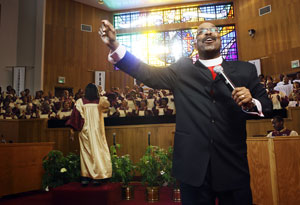A Greener Calling: Preaching the Gospel of Green

Photo: Ben Baker
PAGE 2
Bishop Walter Thomas is the pastor of New Psalmist Baptist Church in Baltimore, a largely African-American congregation of more than 7,000 that is working to increase awareness of water and sanitation issues in Africa.
His eco aha! moment: "In 2005 a group of church leaders from New Psalmist was invited to accompany Dallas megachurch pastor Bishop T.D. Jakes to Kenya. We went to a community called Mbagathi, where everyone cooked, washed their clothes, bathed, and drank all from the same stream. Then we went to a slum outside Nairobi where a million people live without clean running water. We heard about the high rates of infectious diseases like cholera, about girls who couldn't go to school because they had no way of managing their feminine hygiene. We saw the looks in children's eyes that said, Can you help us? We learned how polluting a stream can destroy whole communities—their ability to harvest crops, to stay alive. We saw the hope that something as small as a well could bring."His work: After the trip to Kenya, Bishop Thomas and his congregants partnered with a school and a network of churches in Africa—he estimates their combined reach is 10,000 people—to provide educational supplies and menstrual hygiene kits for students. In 2006 New Psalmist sent representatives to the World Water Forum in Mexico City, which aims to curb water pollution and ease water shortages around the globe. They are now working with the ARC to raise awareness of water and hygiene issues among other religious groups. "We want to make sure those concerns are not somehow lost in the shuffle," he says.
What's next: New Psalmist's latest project will be to promote Peepoo bags, a promising solution for the 40 percent of people worldwide who lack access to toilets. The bags' lining enzymatically breaks down waste, inactivating disease-causing bacteria and parasites and turning the waste into biodegradable fertilizer.
What keeps him motivated: "Genesis says to go forward and subdue the Earth—not destroy the Earth but bring it into harmony so that it can create even more for you. So many of us have been concerned about self-preservation that we haven't had the opportunity to look more broadly at world preservation. And now we are."



